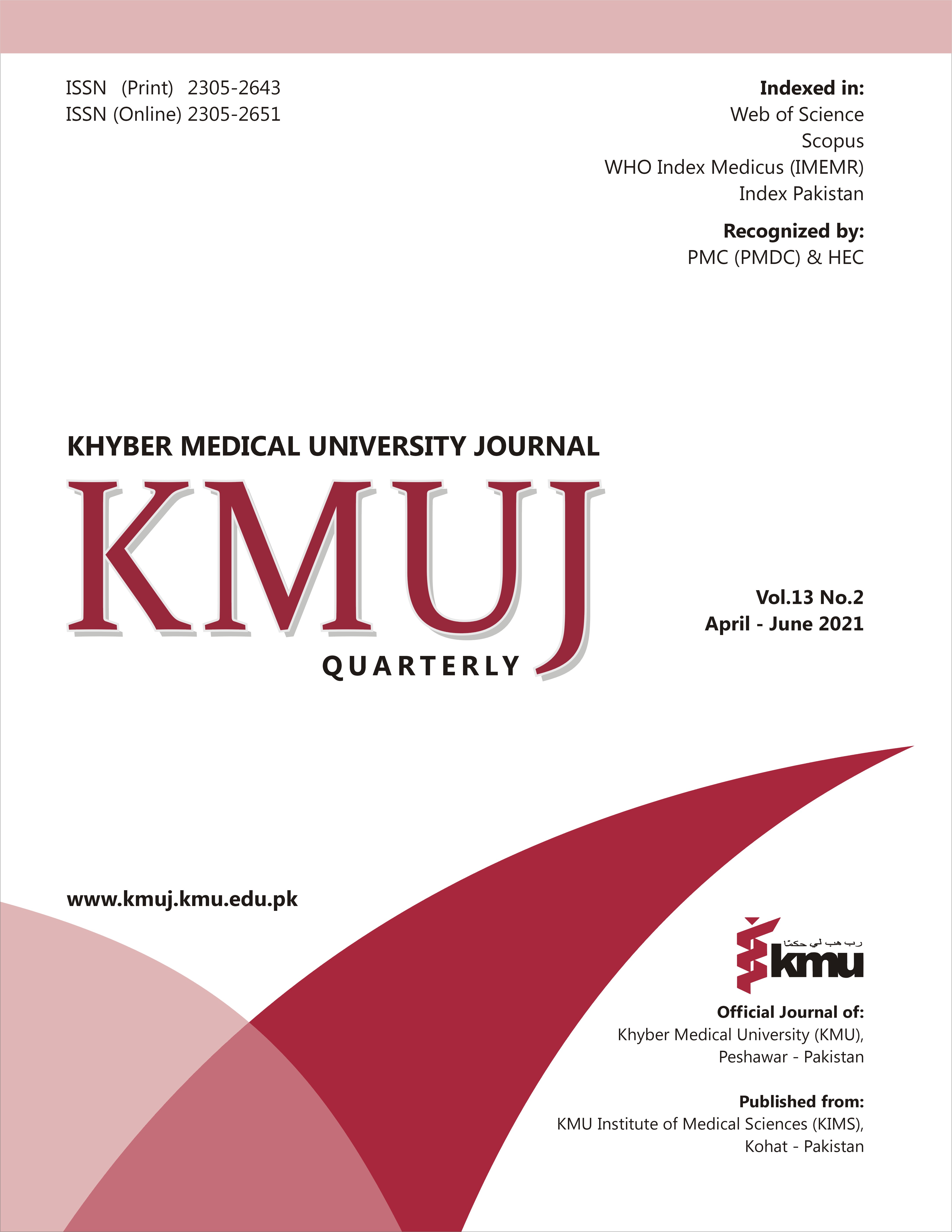BURDEN OF CAREGIVING AND LIFE SATISFACTION AMONG THE CAREGIVERS OF CHILDREN WITH AUTISM SPECTRUM DISORDER
Main Article Content
Abstract
OBJECTIVE: To examine the predictive relationship between burden of caregiving and life satisfaction among the caregivers of children with Autism Spectrum Disorder (ASD) from different cities of Panjab, Pakistan.
METHODS: This correlational study was conducted from January–June 2019, on 71 caregivers of ASD patients from different cities of Punjab province, registered with different autism treatment centers, Lahore- Pakistan. Informed consent was taken from caregivers, selected through purposive sampling technique. Caregiver burden scale by Zarit Burden scale was used to measure family burden while Satisfaction with life scale by Diener ED, was used to measure life satisfaction among the care givers.
RESULTS: Out of 71 caregivers of children with ASD, 55 (77.5%) were females and 16 (22.5%) were males. Caregivers ranged in age from 20-55 years and majority (n=33/71: 46.5%) were from 31-40 years age group. Forty-seven (66.2%) caregivers belonged to joint family. Majority (36/71, 50.7%) of caregivers had 1-3 children and 24 (33.8%) caregivers had 4-6 children. Zarit Burden Scale has a high reliability (α=.84) and life satisfaction scale has satisfactory reliability (α=.74) for current sample. The findings of the study revealed significant negative relationship between burden of caregiving and life satisfaction (r=-0.33, p<0.05). Regression analysis predicted family burden to be negatively associated with life satisfaction β=-0.17, p<0.05. The results reported significant effect of levels of burden on life satisfaction (R2=0.11, p<0.05).
CONCLUSION: Caregiver burden negatively predicts the life satisfaction indicating that caregivers who experience more burden are less satisfied with life.
Article Details
Work published in KMUJ is licensed under a
Creative Commons Attribution 4.0 License
Authors are permitted and encouraged to post their work online (e.g., in institutional repositories or on their website) prior to and during the submission process, as it can lead to productive exchanges, as well as earlier and greater citation of published work.
(e.g., in institutional repositories or on their website) prior to and during the submission process, as it can lead to productive exchanges, as well as earlier and greater citation of published work.
References
Brannan AM, Heflinger CA, Bickman L. The Caregiver Strain Questionnaire: Measuring the impact on the family of living with a child with serious emotional disturbance. J Emot Behav Disord 1997;5(4):212-22. https://doi.org/10.1177/106342669700500404.
Peters-Scheffer N, Didden R, Korzilius H, Matson J. Cost comparison of early intensive behavioral intervention and treatment as usual for children with autism spectrum disorder in the Netherlands. Res Dev Disabil 2012;33(6):1763-72. https://doi.org/10.1016/j.ridd.2012.04.006.
Bromley J, Hare DJ, Davison K, Emerson E. Mothers supporting children with autistic spectrum disorders: Social support, mental health status and satisfaction with services. Autism 2004;8(4):409-23. https://doi.org/10.1177/1362361304047224.
Hauser‐Cram P, Warfield ME, Shonkoff JP, Krauss MW. II. The development of children with disabilities and the adaptation of their parents: Theoretical perspectives and empirical evidence. Monogr Soc Res Child Dev 2001;66(3):6-21. https://doi.org/10.1111/1540-5834.00152.
Dumas JE, Wolf LC, Fisman SN, Culligan A. Parenting stress, child behavior problems, and dysphoria in parents of children with autism, Down syndrome, behavior disorders, and normal development. Exceptionality 1991;2(2):97-110. https://doi.org/10.1080/09362839109524770.
Ezzat O, Bayoumi M, Samarkandi OA. Quality of life and subjective burden on family caregiver of children with autism. Am J Nurs 2017;6(1):33-9. https://doi.org/ 10.11648/j.ajns.20170601.15.
Diener E. Subjective well-being. Psychol Bull 1984;95(3):542. https://doi.org/10.1177/0146167285111008.
Diener E, Suh EM, Lucas RE, Smith HL. Subjective well-being: Three decades of progress. Psychol Bull 1999;125(2):276.
Haybron D. Life satisfaction, ethical reflection, and the science of happiness. J Happiness Stud 2007;8(1):99-138.
Lopez S, McWhirter A, Rosencrans M, Giuliani NR, McIntyre LL. Father involvement with children with developmental delays. Glob Educ Rev 2019;6(1):40-62.
Seligman ME, Pawelski JO. Positive Psychology: FAQS. Psychol Inq 2003;14(2):159-63.
Cho S, Kahng SK. Predictors of life satisfaction among Caregivers of children with developmental disabilities in South Korea. Asian Soc Sci 2015;11(2):154. https://doi.org/10.5539/ass.v11n2p154.
Zarit S, Reever K, Bach-Peterson J. Relatives of impaired elderly: Correlates of feelings of burden. Gerontologis1980;20(6): 649-55. https://doi.org/ 10.1093/geront/20.6.649.
Yap P. Validity and reliability of the Zarit Burden Interview in assessing caregiving burden. Ann Acad Med Singap 2010;39:758-63.
Diener ED, Emmons RA, Larsen RJ, Griffin S. The satisfaction with life scale. J Pers Assess 1985;49(1):71-5. https://doi.org/10.1207/s15327752jpa4901_13.
Park AS. The relationship between the parenting stress and psychological well-being of a mother having a child with autism. Korean J Soc Welf 2012;64(1):225-47. https://doi.org/10.1080/20473869.2017.1279843.
Werner S, Shulman C. Subjective well-being among family caregivers of individuals with developmental disabilities: the role of affiliate stigma and psychosocial moderating variables. Res Dev Disabil 2013;34(11):4103-14. https://doi.org/ 10.1016/j.ridd.2013.08.029.
Nyati Z, Sebit MB. Burden of mental illness on family members, caregivers and the community. East African Med J 2002;79(4):206-9. https://doi.org/ 10.4314/eamj.v79i4.8880.
